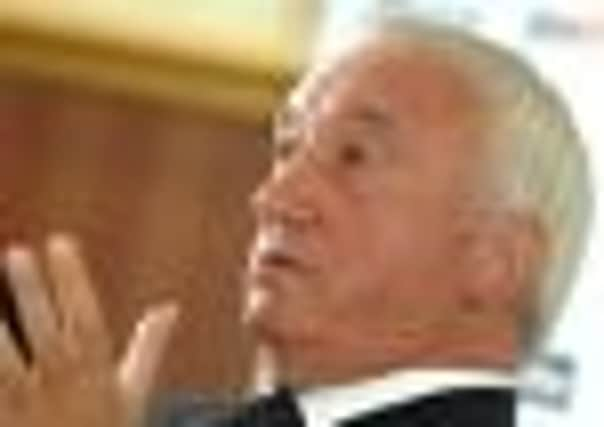Power struggle in S6 resulted in Bates heading north to Leeds


Ken Bates, five or so months into his quest to try to wrestle control of Sheffield Wednesday away from the incumbent board, was in Blackpool watching the Owls in League One action.
Goals from Lee Bullen and Lewis McMahon either side of half-time would ensure the three points accompanied the Owls home from the seaside.
Advertisement
Hide AdAdvertisement
Hide AdIt was not, however, either of the visitors’ goals in a 2-1 victory that stuck in the mind but instead the sight of Bates conducting the half-time draw.
As one of football’s more familiar figures following more than 20 years at the helm of Chelsea, the invitation from the host club maybe should not have come as that much of a surprise.
But considering he was at the time embroiled in a bitter fight for control of the Owls, then it is difficult to imagine a more unlikely sight than the one that greeted the 6,713 crowd inside Blackpool’s then three-sided home on August 10, 2004.
As Bates duly made one fan’s day by pulling out his winning ticket, the former Chelsea chairman continued to chase the main prize of assuming control in S6. The fight was one that would ultimately leave Bates frustrated as Dave Allen and his fellow board members stood firm.
Advertisement
Hide AdAdvertisement
Hide AdAs the club Bates did eventually take over prepare to visit Hillsborough tonight, it is perhaps timely to look back on what was the most bitter of power struggles as accusation and counter-accusation flew back and forth, and several parties got caught in the crossfire.
The saga began in the Spring of 2004 as Bates, fresh from having left Chelsea after being increasingly sidelined by Roman Abramovich’s new regime, looked around for a suitable investment vehicle.
A host of clubs had approached the 73-year-old in the hope he would get involved but most did not appeal. Wednesday, though, were different.
Two relegations in the space of three years meant the Owls were in the third tier of English football. Debts also stood at around £25m. But Wednesday had undoubted potential and Bates had a clear vision to turn the club around.
Advertisement
Hide AdAdvertisement
Hide AdAllen, though, had his own plan as to the best way forward – namely, the sale of the club’s Middlewood Road training ground for housing. And, as quickly became evident once news of Bates’s possible interest in the club emerged, Allen’s vision did not involve the former Chelsea chairman.
Allen made this much clear at Wednesday’s annual general meeting on March 8, 2004, when given a rough ride by shareholders who felt he should at least listen to Bates, who had pledged to invest £10m into the club.
His response was a resounding ‘no’, which heralded the start of a major power struggle that would go on to dominate the Hillsborough news agenda for the rest of the year.
Black balloon protests were staged at the final three home games of the season, while the Owls Trust, a fans’ group with a 9.6 per cent shareholding in the club gifted to them by Allen, sided with Bates.
Advertisement
Hide AdAdvertisement
Hide AdMembers of the fans’ group later appearing with Bates at a press conference in Sheffield would bring an immediate response as the Trust’s page in the matchday programme was scrapped and their office inside the stadium withdrawn.
Supporters were split down the middle and the saga continued to rumble on until disgruntled shareholders forced an extraordinary general meeting in December.
Several shareholders spoke both for and against the board during an often heated two-hour debate at the Ponds Forge Sports Centre before a vote was taken on the motion of no confidence in Allen’s chairmanship and another advocating his removal from the board.
He won both convincingly. Allen, as the owner of a nightclub and casino, had been used to keeping unwanted customers on the street and now he had done the same to Bates.
Advertisement
Hide AdAdvertisement
Hide AdRealising further attempts to wrestle control from Allen and his directors would be futile, Bates locked on to Leeds.
And within six weeks, he was being installed as the new chairman at Elland Road to bring to an end one of the more eventful periods in the history of Yorkshire football.